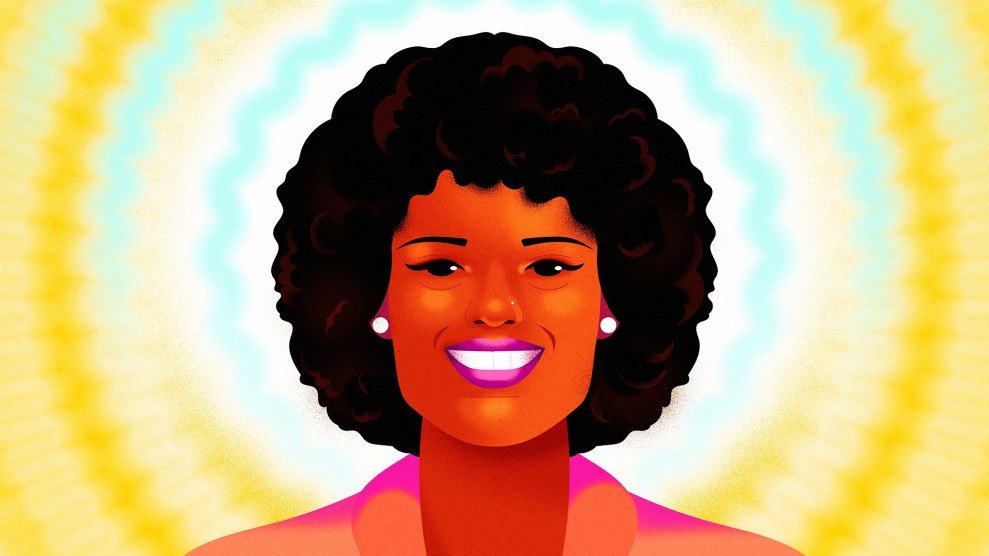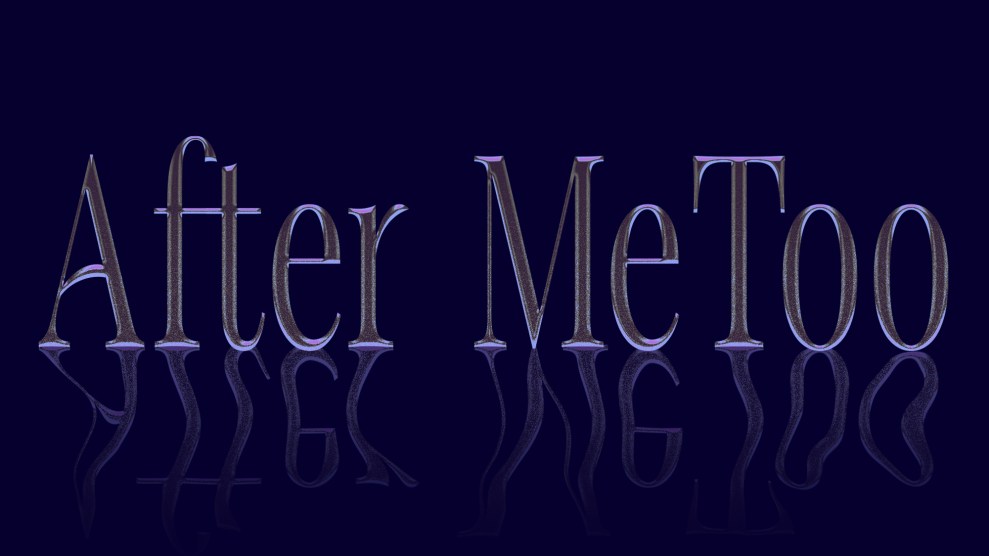More than five years ago, the MeToo movement exploded and our culture shifted. But what actually changed? This project seeks to reexamine the era by asking how it will alter the lives of the next generation.
“During my four years at Los Gatos High School, I could name five well-known students who had raped young women at our school,” Abbi Berry wrote in a letter to the staff of her alma mater in the summer of 2020. “We all knew.”
Berry was enraged by an Instagram post she’d seen earlier in the week from a freshman at LGHS who shared a MeToo story involving a member of a sports team at the high school. “Of the many boys I was warned about, more than half were on the football team,” Berry wrote in the letter. Though Berry, a survivor, was never been hurt by a football player, she saw the culture on the team as a problem that went beyond individual players. (LGHS, the school’s football coach, and the school’s sports director did not respond to our requests for comment.)
I went to LGHS too, and graduated in 2015, five years before Berry wrote her letter. She was right: We all knew. Los Gatos is an affluent Bay Area suburb, where the median household income is $166,000. As Berry put it in our conversations, there’s a Friday Night Lights quality to the culture at the school—academics may be rigorous and competitive, but football reigns supreme.
When Berry pressed send on her letter, she suddenly became a leader of a MeToo movement at the high school she’d graduated from two years prior.
Growing up in our town, it was really clear that sons and boys were valued a bit more.
The football team kind of runs the school, like they’re the big guys on campus. People still do the whole thing where guys give their jerseys to girls on game days, and if someone is wearing a jersey in your class, there’s this weird sense of ownership. We had a lot of traditions focused on sports at our school, and we were a very athletic campus, and there’s a sense of pride and power that comes with that.
I remember freshman year my older friends on the swim team, they were all like, “Stay away from these older guys on the football team that prey on young girls.” There was a normalization of it, where everyone knew the names of the guys who had assaulted girls. Just name after name of all these football players who we were told to stay away from. I think that’s kind of what made clear to me that as a woman, I am less in this space.
Two years after I graduated, a girl who had just finished her freshman year posted a MeToo story on Instagram that gained some traction. A lot of my peers reposted it. I remember reading it over and over again. And I just was like, why is this still a problem? Why is this still happening? Her story focused a lot on the fact that she was struggling so much to show up every day to school, and felt like it wasn’t her place anymore. There was a theme of feeling, because this kid was on a sports team, he had an armor.
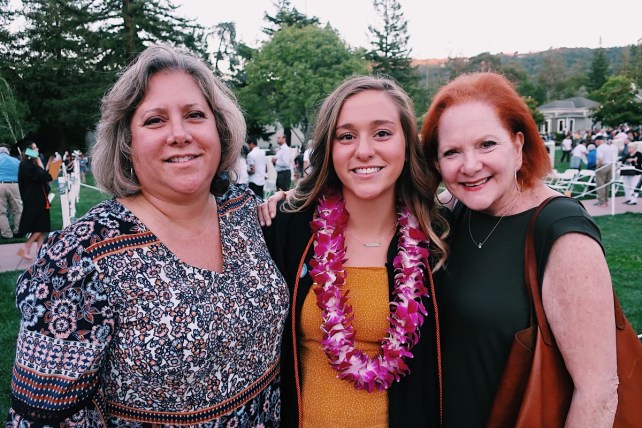
So I drafted an email and ended up addressing the letter to the head football coach and the sports director, because they were the ones who needed to read it, and I wanted to know what they were going to do to change. My bigger message was this isn’t just happening because of a few bad apples. There’s a tradition of toxic masculinity that’s happening throughout the athletic programs and is building and causing these problems. It’s not just the kids who are assaulting people, it’s the kids who know about it and aren’t saying anything to kids who are being creepy toward people at parties. It’s all of these things that were common themes and oftentimes associated with kids specifically on the football team.
In a game-time decision, I decided to sign the letter “for survivors, from a survivor.” I was on the phone with a teacher I trusted who helped me edit the letter, and I said, “I don’t know if I should sign it this way. Because I think if they know that I’m a survivor, they won’t take me as seriously because they’ll think this is just some emotional bullshit.” The teacher paused for a really long time, and he was like, “That’s fucked up.”
My mom read the letter before I sent it. She was like, “I don’t think you should send this. You’ll get in a lot of trouble.” At that point, I was just so angry and disgusted. I was like, fuck this patriarchal BS in this town that we all pretend is absolutely perfect. It’s not real, and people are suffering because of it. There are kids sitting at the top of this hierarchy that are harming other kids. And it isn’t right. I can’t pretend it’s not happening.
Ultimately, I decided to also post the letter to Instagram, and then later to Facebook. In that first couple of days, shit hit the fan.
I was really, really overwhelmed. I kind of became like a spokesperson for MeToo, and a bunch of students and alumni from LGHS felt they could trust me with their own experiences. So, in 72 hours, I read like 300 stories of sexual assault, which was really hard for me. This was very much the beginning of my journey of accepting what had happened in my own experience, and I was not at a point where I could even express what had happened.
But it was more important for me to help the girl who shared her story, and I felt like if I could help her and prevent it from happening again, or at least make space for younger girls, then maybe I could heal the trauma of my younger self. But I was not in a space to be reading that many stories.
An angry football mom DMed me on Instagram and asked me to call her. At that point, I’d only received support or helpful comments. I didn’t know her kids were in football. I called her, and she yelled at me and cussed me out for 15 minutes and told me I was ruining people’s lives, and taking away scholarships from her freshman kids. She said, “You had four years of high school, why are you ruining it for other people?”
Within a couple of days, there were a lot of juniors and seniors who were like, “We want to start a movement, we want to do something, we want to have a march.” So I was balancing all of these kids reaching out to me, and I felt like I needed to protect the girl who posted her story and all the others. Within a week, we had this group of eight of us, and we got the school to let us do an event on the track.
We decided not to name people. That was a really important thing. There were other MeToo movements happening in other high schools, where there were Instagram accounts that were naming people, and I knew that was not going to do anything, and it was going to be super divisive. I stood my ground on that, and the group agreed in part because of fear of legal repercussions.
But another thing that I strongly believe is that because of the way we teach sex and the way we see it on TV, women are raised to be in situations where they don’t have a voice and they become a victim. On the other side of that, in a very heteronormative way, there is a weird expectation for men to take control, and because of the lack of education and conversation around safe sex, there’s a lot of really bad situations that young kids are in, and I think people are just set up to fail.
I felt there were going to be guys or people that probably made girls or other people uncomfortable in hookup scenarios that wouldn’t necessarily be black-and-white assault, but that can recognize what they’ve done and be better. But I also think there are clear cut lines. There are guys that were known to be rapists. And those people gotta go. Those are people that are not willing to get better or function in society, or admit that what they’ve done is wrong. But I was like, if we’re going to get everyone on board with this, we need people that may have abused in the past.
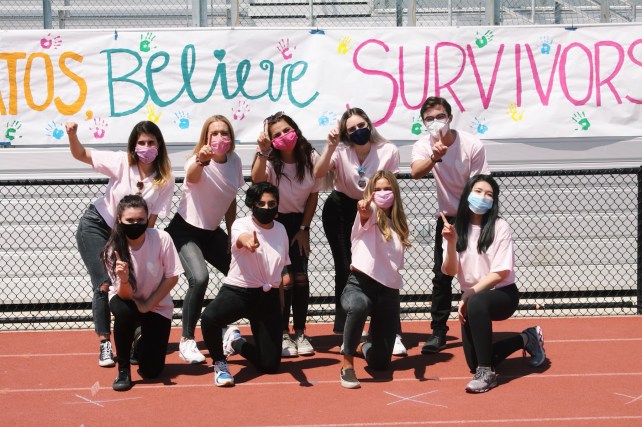
I talked to the superintendent, the mayor, and the police department to plan the sit-in. And I told the superintendent I wanted to talk with the football coach. I wanted a response from him. I never got that, though I was promised it several times.
We were also receiving threats. The high schoolers were receiving threats from other high schoolers. My mental fortitude during this time, as much as it was there, it crumbled really quickly. That was the lowest point for me. It was the most intense emotional experience I’ve ever had.
With the sit-in, there were three things we were demanding. The first one was a clear Title IX procedure, what it would look like if you filed a complaint, because in a lot of the stories I received, it was clear that the students had gone to the teachers they trusted or the coaches they trusted, and there was no follow-up. I wanted something that was clear, so that students knew if they filed a report, something was going to happen.
The next demand was actually having access to a Title IX coordinator. At the time, the coordinator basically didn’t exist. It was really bad. We wanted, basically, a survivor support system on campus.
And then the last demand was four-year comprehensive sex-ed training that was inclusive of all gender identities and sexual orientations. We were like, we want to talk about consent, we want to talk about healthy relationships, teach us these things.
Planning and leading up to the sit-in, there was so much momentum in the group. We were texting all the time, having constant meetings, then, by the time that we did it, we didn’t really know where to go next. There was this weird sense of like, okay, what’s happening? What successes can we be okay with? That was a big thing for me. I was like, have we done enough? Will it ever be enough, and can I be okay with what we got done? I remember really struggling with that all summer, being like, I could have done more, why isn’t there change happening?
After the sit-in, I barely had any contact with the administration. They essentially shut me out. They adjusted their Title IX procedures, and made them more accessible, but it wasn’t very clear, so that was super frustrating. They implemented online training programs at the time, but I have no idea what in-person school looks like now.
But then these people I knew tangentially in high school would reach out to me and be like, “Hey, super random, but my parents and I talked about what you’re doing at the dinner table last night, and about different things we experienced or witnessed.” These were guys too. Men and women who were reaching out and saying this was a topic of conversation. And to me, that was heartwarming and important to hear at the times where I was like, what the heck am I doing? Is there even a point? I’m hopeful that when these boys grow up and have kids, they still will remember these conversations and that feeling of responsibility.
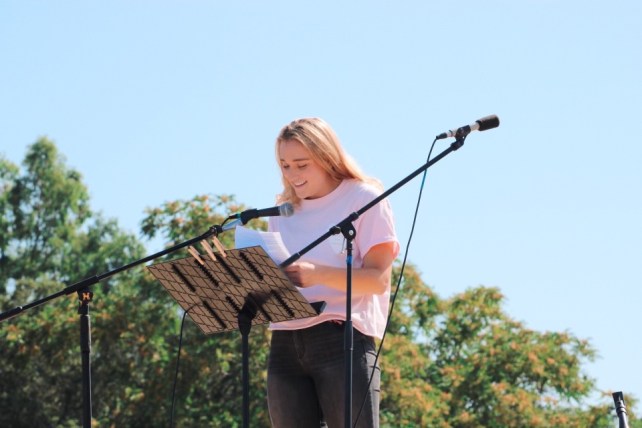
And when the freshman whose post inspired my letter gave her speech on a platform with a microphone on the football field, this incredibly moving speech, and people were in tears, I was like, okay. That’s something that we did. We gave this 15-year-old a platform. And whatever happens next happens. But she got to say her piece, and that’s something that a lot of people that came before her didn’t have. I knew that no matter what, moving forward, she was going to be okay, and we were going to be okay. She still had a future, and this didn’t ruin her life.
Now looking back, I think we really rocked the boat with what we did. And I think it put people who do the wrong things or stand up for the wrong things—it put them on edge. They lost their footing for a second. But I don’t really think it took them off their pedestal.

